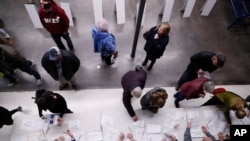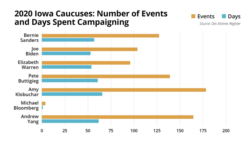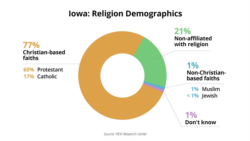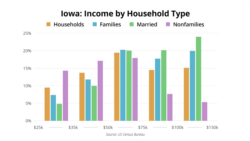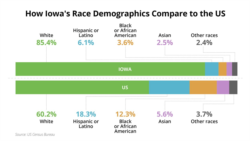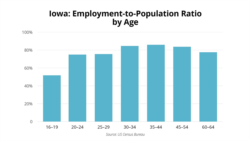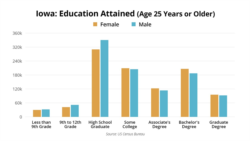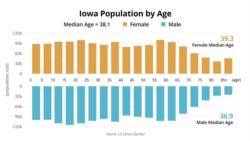Supporters of 11 Democratic presidential candidates across the U.S. state of Iowa huddled in groups on Monday evening hoping their favorite reached a threshold of support to move on to the second round of the Iowa caucuses.
The caucuses are the first major test in the 2020 presidential election as Democrats look for the one candidate who they hope can stop President Donald Trump from winning another term in November.
More than a 100,000 Democrats poured into nearly 1,678 precinct caucuses throughout the state, from tiny churches and community centers and college gymnasiums in rural areas to large arenas in heavily populated urban areas like Des Moines, rallying behind their candidates and seeking to deliver enough votes to help their favorites qualify for precious delegates.
But the candidates and their supporters are having to wait much longer than usual to find out the results, which the Iowa Democratic Party said were delayed due to "quality checks."
The Associated Press quoted Des Moines County Democratic Chair Tom Courtney blaming an app that caucus organizers are supposed to use to report their results, saying those officials are having to resort to an overloaded phone system to give their results.
The 2016 race featured a delay in declaring a winner as former Secretary of State Hillary Clinton and Vermont Sen. Bernie Sanders battled in a close race. Clinton ended up winning 49.9% to 49.6% with Sanders complaining but not seeking a recount. But he said, "We need improvement by which the process is determined."
It was a night of American democracy in action, with voters spending the better part of a winter evening clustering in groups of supporters for Democrats Sanders, former Vice President Joe Biden, Sen. Elizabeth Warren of Massachusetts, former South Bend, Indiana, Mayor Pete Buttigieg, Sen. Amy Klobuchar of Minnesota and others in hopes of achieving "viability" to qualify for delegates.
Voters show their preferences by raising their hands or gathering in groups of like-minded supporters of the candidates.
The Democratic candidates are striving to reach what is called the "viability threshold" -- the 15% of support needed to move on to the second round. Backers of any candidate who fails to meet that 15% are given a chance to throw their support behind their second choice at each caucus -- a process that includes cajoling, horse-trading and seduction before a final statewide count is tallied and a winner declared.
Iowans living outside the state in such places as Florida, Arizona, and even overseas in Paris and Scotland, earlier made their choices in the first-ever satellite caucus.
But the bulk of Monday's contest is occurring in the U.S. heartland in the state of Iowa itself -- a predominantly white state with less than 1% of the country's population that is hardly reflective of the nation's growing racial and ethnic diversity. But as is custom, the contest is first on the political calendar during the quadrennial campaign to win a four-year term in the White House.
As such, the Iowa winner could get a boost in other state contests that soon follow in the nominating process, or shove poor Iowa performers out of the race altogether. Indeed, the major candidates impatiently awaited the results of the caucuses before flying late at night to New Hampshire, in order to begin campaigning vigorously ahead of the critically important New Hampshire primary on Feb. 11.
Statewide polls of Democratic voters going into Monday's Iowa caucuses showed a tight contest at the top between Sanders, a self-declared Democratic socialist, and Biden, a longtime fixture in Washington political circles who is making his third run for the party's presidential nomination.
The political surveys show two other challengers running close behind the front pair, Warren, a one-time Harvard law professor, and Buttigieg, a political centrist and the only gay candidate in the race, with Klobuchar of the neighboring state of Minnesota in fifth.
Preliminary results from an entry poll conducted by Edison Media Research showed about 30% of caucus participants made their decision about which candidate to support in the past few days, and that those late-deciders gravitated toward Biden and Buttigieg.
Sanders led among younger voters, those under age 45, while Biden was the choice for older voters.
The Edison poll found that 60% of caucus-goers said they wanted a candidate who can defeat Trump. About 40% labeled healthcare as their top issue, with 20% picking climate and another 20% income inequality.
Trump's incumbent status means he has little major challenge for his party's nomination, but Republicans did have their own caucus with the president projected to romp to victory with 97% or more of the vote over former Illinois Rep. Joe Walsh and former Massachusetts Gov. Bill Weld.
Despite all the attention it gets, the Iowa caucus has not always been a reliable harbinger of who will win the Democratic Party nomination.
Bill Clinton had a notoriously poor showing in the 1992 caucus with less than 3% support and wound up winning the White House that November.
Texas Sen. Ted Cruz won the 2016 Republican caucus, but Trump was the nominee.
Former Iowa Gov. Tom Vilsack says Iowans believe the purpose of the caucus is to narrow the large field of candidates so the rest of the country has few choices but good choices for the primaries to come. The northeastern state of New Hampshire votes next week, with the southern state of South Carolina and the western state of Nevada voting later in February.




